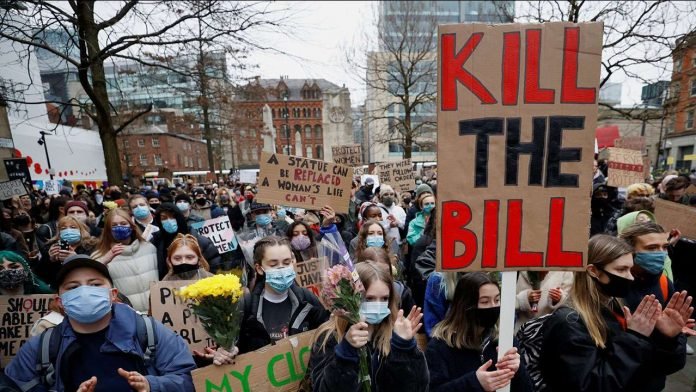
Eight people have been charged with rioting following the first Kill the Bill protest in Bristol.
They will appear before Bristol Magistrates’ Court on May 28 in connection the riot that saw 500 people march on Bridewell police station.
A ninth person has been charged with outraging public decency, Avon and Somerset Police stated.
The Crown Prosecution Service South West Complex Casework Unit has authorised charges following a review of evidence submitted by Avon and Somerset Police.
Ryan Roberts, aged 25, from Plymouth, who has already appeared in court, has now been charged with riot, as well as two arson offences, and will next appear at Bristol Crown Court at a date to be confirmed.
The following people have now been charged and will appear before Bristol Magistrates’ Court on 28 May 2021:
• Benjamin Rankin, aged 40, from Bedminster, Bristol – charged with riot and an arson offence
• Jasmine York, aged 26, from Arnos Vale, Bristol – charged with riot and an arson offence
• Kane Adamson, aged 21, from Bedminster, Bristol – charged with riot
• Mariella Gedge-Roberts, aged 26, from Clifton, Bristol – charged with riot
• An 18-year-old man from Springfield, Birmingham – charged with riot
• Brandon Lloyd, aged 21, from Henbury, Bristol – charged with riot
• Stuart Quinn, 46, from St Paul’s, Bristol – charged with riot
• Yasmin Schneider, aged 25, from St Paul’s, Bristol – charged with two counts of outraging public decency
Chief Superintendent Carolyn Belafonte of Avon and Somerset Police said Thursday’s charges were a “significant development” in the investigation into the night’s events.
“We remain resolute in our commitment to fully investigate offences committed in the vicinity of Bridewell police station and the wider city centre on the evening of Sunday 21 March and we anticipate there will be further people charged in the coming days and weeks as we continue to make further progress,” Chief Superintendent Belafonte said.
The Police, Crime, Sentencing and Courts Bill
The “Kill the Bill” movement was sparked by the introduction of the Police, Crime, Sentencing and Courts Bill, which would give police officers more power to impose conditions on protests, including noise and time constraints.
The bill has passed its second reading in parliament and is now in committee stage, where MPs are given time to further scrutinise the contents.
In April Jeremy Corbyn joined protesters at Hyde park and proclaimed:
“I want a society where it is safe to walk the streets, where you can speak out, you can demonstrate and you don’t have to seek the permission from the police or the home secretary to do so,”
The Police, Crime, Sentencing and Court Bill is an immense piece of proposed legislation that makes provisions for a broad range of issues in its nearly 300 pages. The bill — which covers England and Wales — introduces harsher penalties for serious crimes, ends a policy of early prison release for some offenders and prevents unauthorized encampments, among other sweeping measures.
But tied into some good legislation the bill also gives broad authority to police forces when it comes to handling protests — and that has proved to be a lightning rod.
Under current law, the police must first determine that a demonstration could result in serious public disorder, property damage or serious disruption to the life of the community before it can impose restrictions.
The new bill would offer much broader powers for the police. It will leave much to their own discretion, and potentially allow them to criminalise protests they deem a “public nuisance.”
The police, for example, would be allowed to set time and noise limits on rallies. Protesters who do not follow restrictions they “ought” to know about, even if they have not received a direct order from an officer, would be vulnerable to prosecution.
The bill also makes it possible for those who damage memorials to be sentenced to up to 10 years in prison.
The Police, Crime, Sentencing and Courts Bill is an assault on our freedoms and should be fought against at all levels.
The British people are many things and have many layers of complexities but the one thing that binds us all is our freedoms, those hard fought battles from the Magna Carta of 1215 to the Human Rights Act 1998, were not given they were won.
Freedom of speech and the right to protest peacefully are protected by the law both the common law and the Human Rights Act 1998 cover these fundamental rights.
Common law stipulates our rights: personal security, personal liberty and private property, and auxiliary rights necessary to secure them, such as access to justice. Rights to a fair trial, right to open justice and to freedom of speech are recognised both in the common law and in the Convention of Human rights.
The British people will and must guard their freedoms fiercely, lest they be taken away.
Support Independent Journalism Today
Our unwavering dedication is to provide you with unbiased news, diverse perspectives, and insightful opinions. We're on a mission to ensure that those in positions of power are held accountable for their actions, but we can't do it alone. Labour Heartlands is primarily funded by me, Paul Knaggs, and by the generous contributions of readers like you. Your donations keep us going and help us uphold the principles of independent journalism. Join us in our quest for truth, transparency, and accountability – donate today and be a part of our mission!
Like everyone else, we're facing challenges, and we need your help to stay online and continue providing crucial journalism. Every contribution, no matter how small, goes a long way in helping us thrive. By becoming one of our donors, you become a vital part of our mission to uncover the truth and uphold the values of democracy.
While we maintain our independence from political affiliations, we stand united against corruption, injustice, and the erosion of free speech, truth, and democracy. We believe in the power of accurate information in a democracy, and we consider facts non-negotiable.
Your support, no matter the amount, can make a significant impact. Together, we can make a difference and continue our journey toward a more informed and just society.
Thank you for supporting Labour Heartlands











